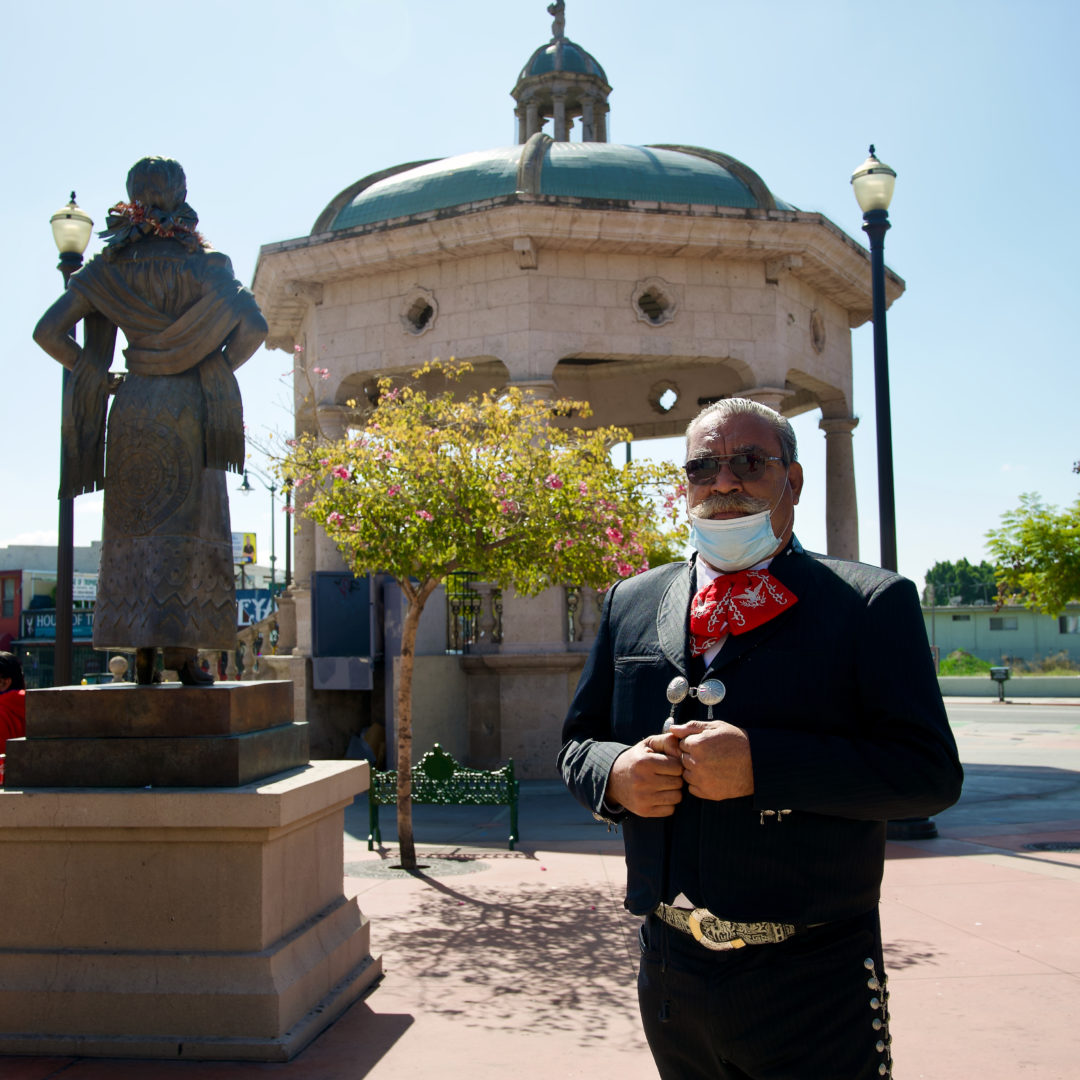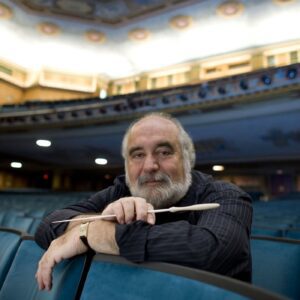 View Winners →
View Winners → 
The combination of non-essential business closures and crowd restrictions have been a double blow for the mariachi community struggling to survive the economic hardships the pandemic has caused for hundreds in this musical industry who depend on performing for large crowds to earn a living.
It has been over a year since the Centers for Disease (C.D.C.) introduced restrictions to help stop the spread of COVID-19 and as the vaccine is limited, restrictions for large gatherings remain relatively unchanged and are not recommended.
“First, we are not considered essential. Second, we cannot play in large gatherings. As a long-standing tradition of playing mariachi music for our local residents, our mariachi community has been impacted greatly because of the lack of work available since the pandemic started last year this month,” said Ismael Rojas, an actor and composer with an international trajectory with Mariachi Primavera.
Rojas has been playing with mariachis in Los Angeles for over 20 years but since the pandemic, most calls for hire have been to play at funerals.
Earlier this year, Los Angeles County Public Health Director Barbara Ferrer said that the average number of Latinos dying of COVID-19 daily over a two-week period jumped from 3.4 per 100,000 in November to 40 per 100,000 by the end of January. “That’s an increase of over 1,000%,” she said at the time.
“Our Latinx community is in fact bearing the worst of the pandemic,” she lamented during her weekly update.
Though there have been more calls to play at funerals, Rojas said they are not enough to provide a steady income as most funeral homes also implement restrictions on crowd size and many cemeteries do not allow live music on site during burials.
“Live mariachi music is not permitted in a lot of places and the limited number of people allowed in large gatherings normally is surpassed by the total number of people attending funeral services — which include family members and mariachi band players that can average from five to 12 players depending on the client’s budget.”
Since the pandemic began, Rojas has witnessed many mariachi players lose their lives to COVID and sadly recalls how many of them did not take the pandemic seriously.
“At the beginning of all this, in March of last year — when restrictions and guidelines were recommended to be put in place to help stop the spread, such as social distancing and wearing a mask — many of my fellow colleagues here in our [Mariachi] Plaza were very skeptical. They did not take the virus seriously and a lot of them refused to wear a mask or even make an effort to protect themselves.”
Rojas, who has underlying health conditions, started protecting himself at the very start of the pandemic and encouraged others to wear a mask. Sadly, not many followed suit and a lot of them perished from COVID.
Rojas’ efforts kept him safe until December of last year. He was then diagnosed with COVID and fought off the virus on his own because he did not want to go to the hospital.
“I didn’t want to go to the hospital because of how many people are dying at hospitals. I was afraid that if I went to a hospital, I would die. The word got out that hospitals were being over saturated with patients and once you got on a ventilator you would pretty much be unattended due to lack of hospital personnel,” he shared. “It was either risk dying alone in a hospital with strangers or die in peace with loved ones at home. This is a sad reality for a lot of us in this community.”
He has since recovered but admits it was not easy. He continues to wear a mask and takes extra precautions to keep safe, including getting vaccinated.
“I got my first shot already and I’m scheduled to take the second dose soon. The vaccine may be the only hope we have left to be able to play our music in large crowds but I’m already coming across people who do not want to take the vaccine because of misinformation spreading on social media,” Rojas said.
A recent article from USA Today, that includes an analysis performed last year by human rights non-profit Avaaz, found that Facebook did not put warning labels on 70% of Spanish-language misinformation versus 29% of misinformation in English. According to USA Today, health and vaccine-related misconceptions and conspiracy theories are some of the most widespread forms of misinformation targeting Hispanic communities.
Some of the vaccine-related falsehoods being spread on social media posts claim that the vaccine contains a microchip, causes cancer and/or is part of a satanic ritual.
Many advocate organizations, like the National Hispanic Media Coalition, are putting pressure on Facebook to do more. They want the platform to monitor and tag the posts with disclosures warning the public of misinformation in Spanish. Although Facebook says it is already doing so, advocates say it is not enough and many are focusing on countering misinformation by debunking theories through community outreach.
“I believe that it is prudent that we all do our part to get vaccinated. Otherwise, it will be us who will continue to harm ourselves by leaving the possibility and the risk of becoming infected with the virus,” stated Rojas.
Economic hardships caused by the pandemic have dealt another devastating blow to the mariachi community in the form of housing insecurity.
“Before the pandemic interrupted all of our lives many of us were already struggling to make ends meet and pay rent. By the time eviction moratoriums were put in place, many mariachi musicians had already been forced out of their homes and many are living in large vehicles that once served as our form of transportation to events,” shared Maria Zelaya, vocalist and member of Mariachi Celaya.
The pandemic has exacerbated the housing crisis by the thousands in Los Angeles and experts predict that it will only get worse. In January, the nonprofit organization Economic Roundtable released a report, titled “Locked Out,” that used data from the 2008 recession to predict how much the pandemic-induced economy will impact people in need of housing. According to the report, chronic homelessness in Los Angeles County may increase up to 86% in the next four years.
The president of Economic Roundtable, Dan Flaming, told ABC7 that “This recession is particularly bad because it’s hitting vulnerable workers harder than the last recession.”
Maria Zelaya, a U.S citizen who has lived in California for over 50 years and has played in mariachi bands for 22 years, said she knew her community was in danger when she began receiving call after call to cancel events that had been scheduled for months in advance.
Everything came to a complete halt last December when she contracted the virus from an event where she performed. Zelaya also did not go to the hospital out of fear of not being properly cared for by the hospital staff. She still does not feel entirely healthy and has not worked since last December. She was able to apply and qualify for unemployment benefits and that is what has been helping her financially.
Zelaya described how many people at gatherings where her mariachi performed did not follow health guidelines. The majority of people did not wear masks or maintain social distancing, she said.
“We have to work. A lot of us are afraid and are not aware of the laws that protect us. Unfortunately, undocumented mariachi musicians believe they are not entitled to any protections because of their legal status.” said Zelaya.
Since she is not considered an essential worker (a classification she disagrees with) she is not yet eligible for the vaccine but her husband who meets the age requirement did receive it. Zelaya feels it is unfair that living with him is not enough to have her qualify for the vaccine.
“Married couples should qualify to get vaccinated together regardless of whether you meet the age requirement or not because as a married couple you both live together under the same roof. That rule made me feel as if my husband’s life is more valuable than mine,” she said. “Until I get a vaccine, I continue to be at risk of contracting the virus.” She is currently on a waiting list to receive the vaccine if someone doesn’t show up for an appointment.
Zelaya has lost several family members to the pandemic and is currently self-isolating until she gets vaccinated because she is still experiencing mild COVID-like symptoms.
“I don’t feel safe even being around my husband. I tend to spend most of my time at home in isolation to prevent getting him or someone else infected. My son is currently angry with me because I will not visit him and my grandson. But at this point, my health and the health of others is my main concern.”
I asked what she would say to those in her community who may be hesitant about the vaccine. “Don’t be afraid. The pandemic is real. Get the vaccine as soon as you can,” she answered.
She also added that the mariachi community needs a lot of attention and love from the local neighborhood because being part of a band is a labor of love. It requires years to master a performance and a lot of them dedicate long hours of practice. Being a mariachi is a life-long career and for many of them, their only way to make a living.





































































































